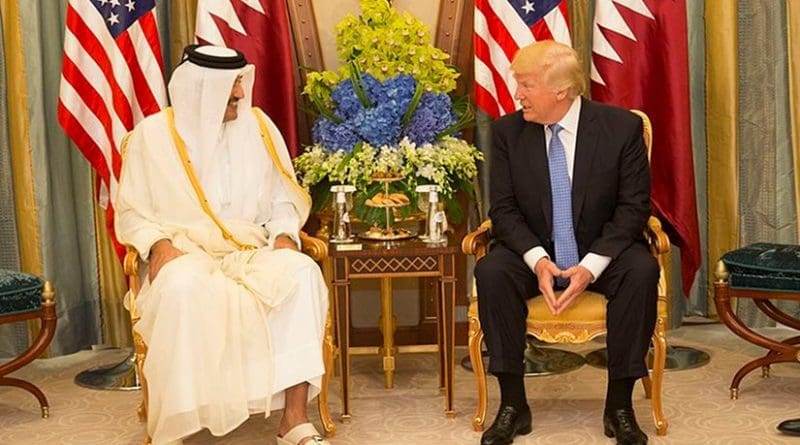US Ups Engagement In Qatar Crisis; Trump Calls Riyadh And Doha
By Arab News
By Joyce Karam
Two days following the standoff between Qatar and its Gulf neighbors, US President Donald Trump dialed up Washington’s engagement in a phone call to the Qatari Emir Sheikh Tamim bin Hamad Al-Thani.
Former US ambassador to UAE and career diplomat Marcelle Wahba told Arab News that the Trump calls are “relieving” after “lack of coordination and incoherent message” from the administration early on the crisis.
The White House announced on Wednesday that Trump’s call to Tamim “emphasized the importance of all countries in the region working together to prevent the financing of terrorist organizations and stop the promotion of extremist ideology.”
The statement said Trump “reiterated that a united Gulf Cooperation Council (GCC) and a strong US-Gulf Cooperation Council partnership are critical to defeating terrorism and promoting regional stability.”
The US also “offered to help the parties resolve their differences, including through a meeting at the White House if necessary.”
Wahba, who now serves as president of the Arab Gulf States Institute in Washington, told Arab News it is “relieving to see President Trump call Saudi King Salman and the emir of Qatar.”
The former ambassador stressed the importance of “a unified position from the US administration” instead of the “confusing number of voices” that came out of the Pentagon, the White House, the State Department and Trump’s Twitter account in the last few days.
Yet Wahba said “there’s still no evidence of an active US diplomatic initiative to get serious dialogue between the parties.”
The former ambassador contended that “given the long relation and history we have in the region, we can be more engaged, have more leverage and play a more active role.”
While ultimately “Qatar has to change some of its policies,” the US should be more engaged, said Wahba.
The standoff in her opinion is a product of “very serious differences that have been brewing for a very long time, parallel to increased vulnerabilities in the region such as the war in Yemen, decline in oil revenues and efforts at restructuring economic reforms.” This “increases the frustration and makes these differences more acute.”
Wahba read the absence of early engagement from the Trump team as a result of “lack of experience, lack of coordination and lack of clarity, and lack of engagement.”
“The US needs to be engaged more, needs to be more public, whether it’s the White House, the State Department or the Pentagon.”
Such engagement should show “support for the mission of Kuwait’s Emir Sheikh Sabah Al-Ahmad Al-Sabah, encourage dialogue and be more actively engaged” Wahba said.
She added that the US could make clear to Qatar that, “we value our relationship but we have concern” and to the other parties that “we would like to see more dialogue, and preserve a unified GCC.”

